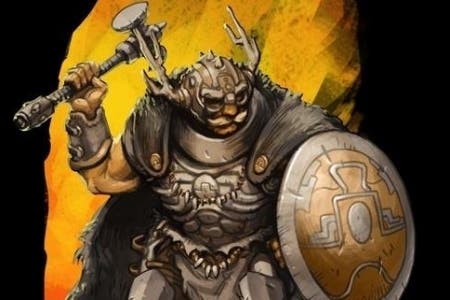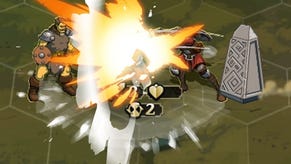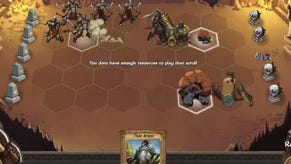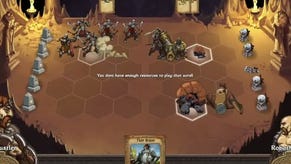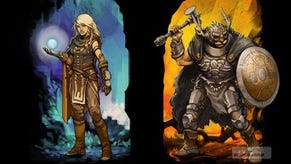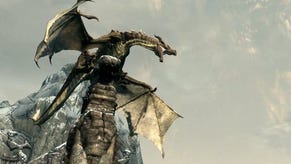Scrolls: from building blocks to building decks
Mojang's follow-up to Minecraft is a very different beast.
It would be thematically neat and tidy to suggest that, if Mojang's first game is all about the joys of creativity, its second is more concerned with the dark charms of destruction. That might not be entirely true, however. As anyone who's ever built a tower of TNT blocks in Minecraft will tell you, Notch's runaway indie hit is entirely comfortable with the ancient art of blowing things to pieces. Equally, while Scrolls is a smart combination of card battler and board game where the emphasis lies with taking out your enemy's units and ultimately destroying the idols they're protecting, throw in a deck building component, and you've got plenty of more constructive delights to lose yourself within.
A better way of looking at things might be to argue that while Minecraft is a playset in which almost anything at all can happen, Scrolls is a game that benefits from a surprisingly sharp focus. That doesn't mean that its simple core doesn't hold depths, of course. Those depths will become apparent within the space of your first few matches, in fact.
Scrolls is a turn-based game in which you fight your human or AI opponent across a battlefield made up of hexes. Units placed on the game board will generally attack the idols sitting at your enemy's end of the row when their individual countdown meters hit zero - usually after two or three turns - and you summon these units - along with your spells and enchantments - by playing the cards you hold in your hand.
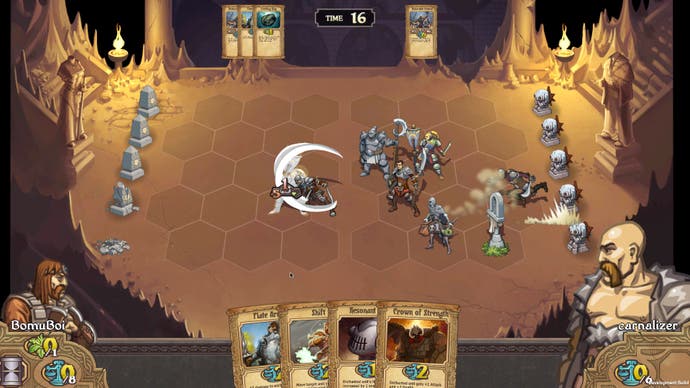
Divided across three different resource groups - a fourth is apparently on the way - your cards hold a nice selection of treats, too. When it comes to creatures, alongside fearsome damage-dealers like scattergunners and iron ogres, you've got things like bunnies that multiply in the blink of an eye and machine priests that can heal structures. Speaking of structures, you'll be able to build a neat range of mortars, walls, or even perk-providing wells that heal your team. Spells and enchantments, meanwhile, allow you to do anything from limit your own units' cooldowns to actually move enemy pieces around their half of the board. Variety isn't a problem in other words, even though with so many elements in play, balancing may be entertainingly precarious. Every unit has its own quirks: cheaper pieces could be weak, for example, or they could have lengthy rest periods between attacks.
Resource types seem to break down along thematic lines for the most part. Growth seems to offer plenty of fairly low-cost units that are useful early on before scaling to a handful of more expensive bits and pieces for the end-game, while Order provides armies that sync together well and puts a heavy emphasis on spells. Energy, meanwhile, is composed of steampunk ghouls and lots of complex weaponry and lobbers - all of which tend to come with slightly higher prices, as far as I can tell.
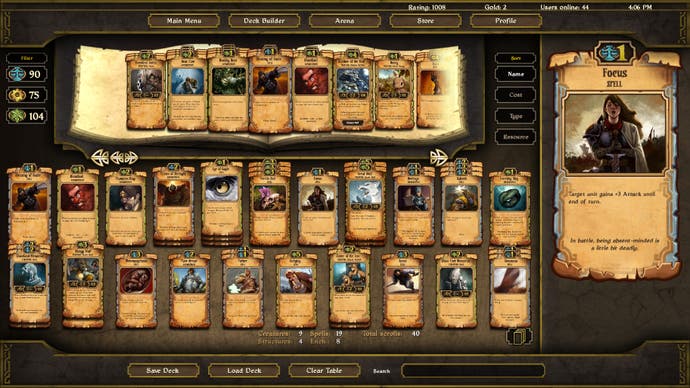
Each card has its own resource cost for summoning, of course, and you earn that resource, in a neat little twist, by sacrificing the cards in your hand rather than playing them. Although a card's cost is bound to a specific resource, they'll all give you the option to cash them in to permanently increase your pool of any of the game's trio of resources by one point - or you could exchange them for two more cards from your stack instead. Choose carefully: you can only sacrifice once per turn. On the plus side, though. each turn also deals a new card into your hand anyway, and sees your existing resource pools refilled. (At first, when the game's complexities are sinking in, it's helpful to just pick a single resource type to play with, incidentally. Scrolls is a very different beast when you're using multi-resource decks.)
I've made it sound complicated, but a decent battle tutorial carries you through your first game with very little confusion. Beyond that lies a rich challenge that combines clever use of your cards with spatial logic and timing as you seek to move your troops around the board - one move each per turn - so that they're performing double duty: protecting your idols and attacking the enemies'. More powerful units and spells can change the flow of a battle, but they come at an increased cost in resources: the need to build your stockpiles up from zero, a single sacrifice at a time, makes the game's early rounds sharply tactical, and often a little painful as favoured cards get the chop. All the while, simple but characterful animations and some lovely unit art - particularly when it comes to the shonky mechanical grot of the Energy types - ensures Scrolls is a very pleasing game to look at. Once again, Mojang's hit on a fairly straightforward visual design - albeit one that is light years away from Minecraft's blocky vistas - and made it really sing.
Outside of the battles, it's all about building up your card collection and sorting them into decks, perfectly tuned for different approaches. Or you could build them into decks that are useless for just about any challenge the game can throw your way, of course. This is my approach, it seems, and I would love to lend you custom decks like 'Mess 5' and 'Bad jumble' to show you just how deeply a mindless defeat can sting. New cards are bought using the gold you're awarded after each match, and you currently purchase them blind from the in-game shop. The deck builder has a nice drag-and-drop setup, but as the whole project's in alpha, don't expect a great deal of in-game tips for anything that happens off the battlefield.
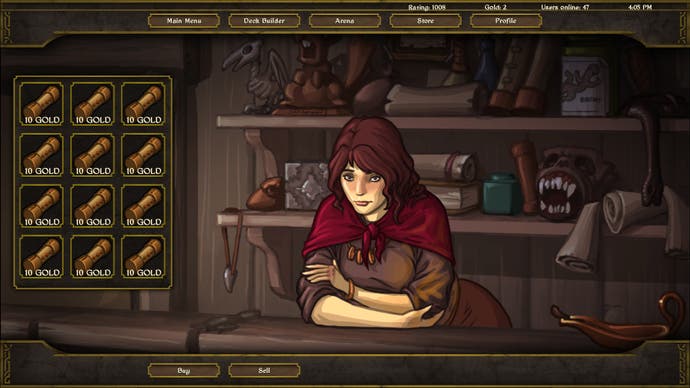
Scrolls is still lacking key features, too, with no campaign or tournaments yet implemented by the looks of it, and little to explain the different ins and outs of the resource types. All of that stuff is coming, though, and the community's done some lovely work putting together FAQs and Wikis that will prove invaluable for your first few days of playing. What you can already enjoy - at least when the alpha goes public - are quick or ranked matches against human opponents and skirmishes against decent AI.
I'm far too inexperienced with the game to talk much about things like balance yet, although I've found Energy is personally the best resource for me to focus on when I'm still learning to pull my own decks together. Seeing as this is Mojang, though, you can probably expect an eternity of tweaks and updates as the game evolves. Even in closed alpha, Scrolls is a wonderfully dependable kind of fun, of course: it's not afraid to plunder the classics for inspiration, but it's also a deep and yet strangely compact game. It benefits from a clear-eyed ruleset and from the goodwill earned through Minecraft that Mojang's not going to unbalance the economy on a whim or nickle and dime you over new cards.
As projects go, it's unlikely to reach the kind of audiences the team's first release has found, perhaps, but that was probably never the point. By the looks of it, Scrolls is primarily concerned with building a like-minded community around a clever, rather tidy card-battler and then making it the best game it can be.
